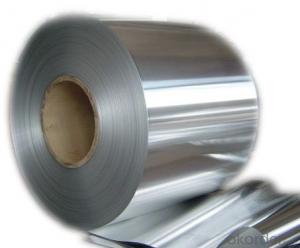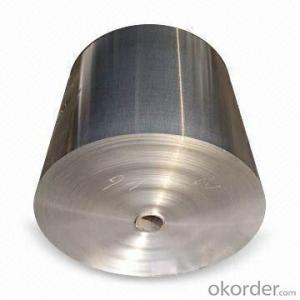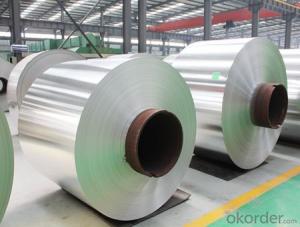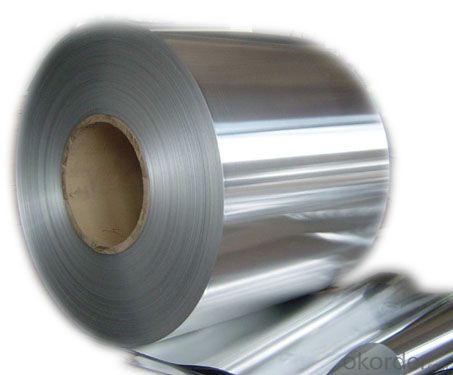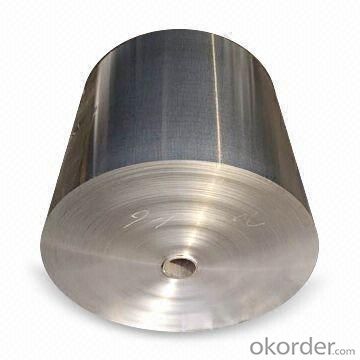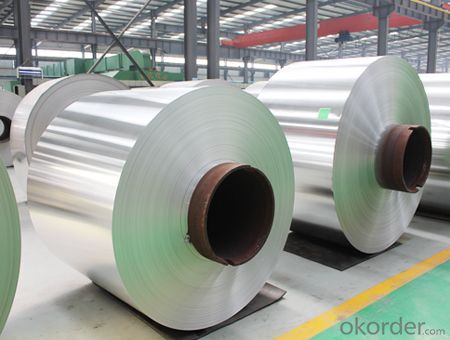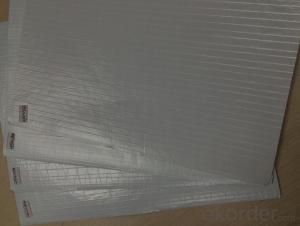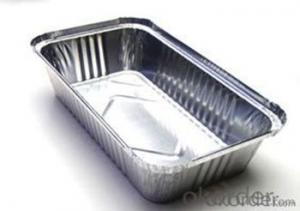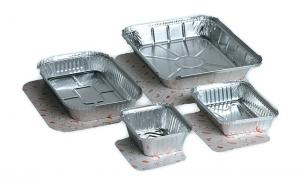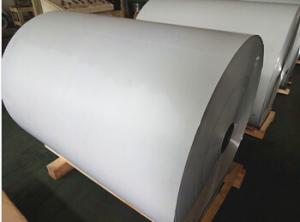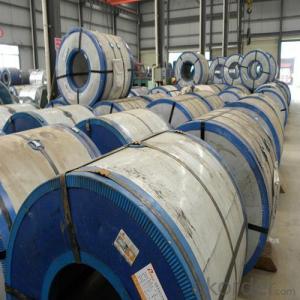Copper Colored Aluminum Coil - Aluminium Foil Containers Hot Demanded Good Price
- Loading Port:
- Shanghai
- Payment Terms:
- TT OR LC
- Min Order Qty:
- 5 m.t.
- Supply Capability:
- 2000 m.t./month
OKorder Service Pledge
OKorder Financial Service
You Might Also Like
1, Aluminium Foil Container Description:
Aluminium foil is widely sold into the consumer market, often in rolls of 500 mm (20 in) width and several metres in length. It is used for wrapping food in order to preserve it, for example, when storing leftover food in arefrigerator (where it serves the additional purpose of preventing odour exchange), when taking sandwiches on a journey, or when selling some kinds of take-away or fast food. Tex-Mex restaurants in the United States, for example, typically provide take-away burritos wrapped in aluminium foil.
2,Main feather of Aluminium Foil Container:
1, Made of advanced pollution-free aluminum, 100% food safe;
2,Environmentally friendly, recoverable and recyclable
3,High-temperature sterilization
3, Aluminium Foil Conatiner Images:
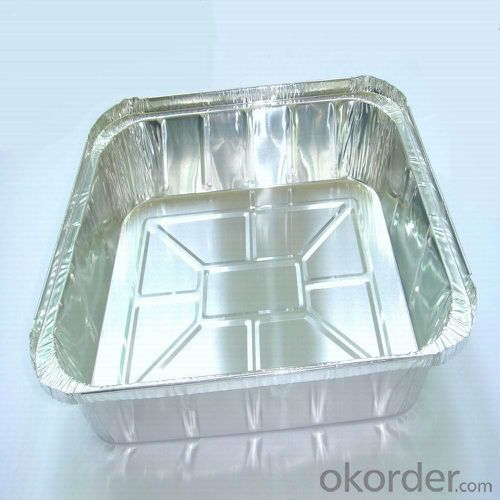
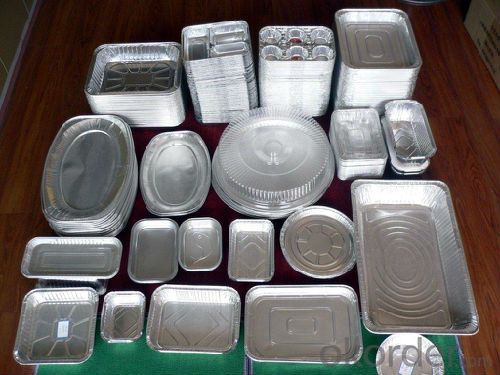
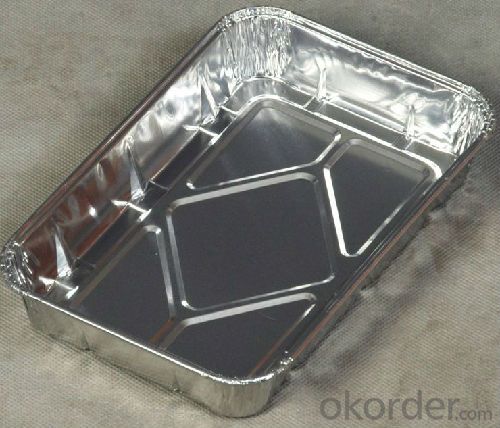
4,Aluminium Foil Container Specifications:
Top Out:160x110mm
In Out:145x95mm
Bottom:125x75mm
Height:35mm
5,FAQ:
a.What is monthly capacity
---CNBM is one stated own company and our monthly capacity is about 2000tons.
b. Now which countries do you export your goods?
---Now we export to South East Asia,Africa, North America,South America ect.
- Q: Are aluminum coils affected by magnetic fields?
- Yes, aluminum coils can be affected by magnetic fields to a certain extent. Aluminum is a non-magnetic material, meaning it does not possess any inherent magnetic properties. However, when exposed to strong magnetic fields, aluminum can experience an induced magnetic field due to a phenomenon called electromagnetic induction. This can result in a slight attraction or repulsion between the aluminum coil and the magnetic field, although the effect is generally weaker compared to materials with magnetic properties, such as iron or steel. It is important to note that the degree of interaction between aluminum coils and magnetic fields depends on several factors, including the strength and proximity of the magnetic field, the shape and size of the coil, and the specific composition of the aluminum alloy used in the coil.
- Q: What are the proper storage methods for keeping aluminum coil in good condition?
- <p>To store aluminum coil properly, ensure a clean, dry, and well-ventilated environment. Keep the coil away from moisture and direct sunlight to prevent oxidation and discoloration. Store coils horizontally on wooden pallets or racks to avoid deformation. Maintain a consistent temperature and avoid extreme fluctuations. Use protective coverings or wrapping to shield the coil from dust and contaminants. Regularly inspect the coils for any signs of damage or corrosion and address any issues promptly.</p>
- Q: How are aluminum coils used in the production of medical equipment?
- Aluminum coils are widely used in the production of medical equipment due to their unique properties and versatility. One of the primary applications of aluminum coils in the medical industry is in the manufacturing of various medical devices, such as MRI machines, X-ray machines, and ultrasound equipment. Aluminum coils are utilized in the production of medical equipment mainly because of their excellent conductivity. This property allows them to efficiently conduct and dissipate heat, which is crucial for the proper functioning of medical devices. For instance, MRI machines generate a significant amount of heat during operation, and aluminum coils help in regulating and maintaining the desired temperature to ensure optimal performance and patient safety. Moreover, aluminum coils are also highly malleable and can be easily formed into different shapes and sizes. This makes them ideal for the production of medical equipment, where intricate designs and precise specifications are often required. For example, aluminum coils are used in the construction of radiation shields, which protect medical personnel and patients from harmful radiation emitted by X-ray machines. In addition, aluminum coils are lightweight yet durable, making them an excellent choice for medical equipment that needs to be portable or easily maneuvered. This is particularly important for devices like portable ultrasound machines, where lightweight components are necessary for ease of use and transportation. Furthermore, aluminum coils have excellent corrosion resistance, which is vital in the medical field where cleanliness and hygiene are of utmost importance. The resistance to corrosion helps in preventing the buildup of bacteria, germs, and other contaminants on the surface of medical equipment, ensuring a safe and sterile environment for patients and healthcare professionals. Overall, aluminum coils play a crucial role in the production of medical equipment by providing properties such as conductivity, malleability, lightweight, durability, and corrosion resistance. These properties allow for the efficient and safe operation of medical devices, contributing to improved patient care and well-being.
- Q: What are aluminum coils used for?
- Aluminum coils are commonly used in various industries, such as construction, automotive, and HVAC, for their excellent thermal conductivity and corrosion resistance properties. They are primarily used for manufacturing heat exchangers, air conditioning systems, refrigeration units, and other heat transfer applications.
- Q: I don't know, I see a metal is a metal. I understand that a bike shop bike has better service and the bike has better components. Yet I just feel the frame of a $500 bike store bike and a $100 bike from Walmart using aluminum is the same. It's like people charging $100 for audio/video cables when a $1 no-name cable works the same for tv. Is this the same marketing ploy in the bike industry?I see a Mongoose bike for $500 to $1000 on their website, yet I see one with the same frame metal at Walmart/Kmart for only $100. Mongoose is a reputable name. What gives?What do you think? Is the metal quality in a $500 aluminum bike shop bike the same as a $100 aluminum department store bike?
- Many good points above, especially about service. I re-emphasize the comment about the tubing. Aluminum bikes are not just aluminum they are aluminum alloy and it's not just the formula it is the process of forming the tubes that builds strength, but the problem isn't that Walmart frames are really that likely to break although they might. And as for the car comparison - Toyota vs. BMW doesn't do the story justice. Entry level bike store bikes are Toyotas Corollas and Ford Focuses (not BMWs) and Walmart bikes compare to Yugo's or some other Soviet Era car - at best. There really isn't a car out there on the US market that sucks as much as a Walmart bike. My 3 biggest problems with department store bikes in general: 1) Brakes - regardless of what type of system used they universally SUCK the levers are often to flimsy and about 1/2 the time even a competent mechanic can't get the brake system to work satisfactorily. 2) EVERY SINGLE bolt, nut and washer (that all look shiny in the store) is the cheapest possible and the RUST practically the very first time they get wet, and they strip, break, and lock-up something terrible making repairs a total pain. 3) They aren't designed to be repaired, they are designed to be ridden and tossed in the garbage. And Yes the dual suspension is worse than a bad value - it actually makes the bike WORSE. Yes WORSE. Not only is that bike useless for actual mountain bike and the suspension totally not up to the task, it will also bounce up and down as you pedal down the road sucking all of your effort into the suspension instead of moving. It gets worse when riding up hill. AND the shocks add extra weight AND when the shocks blow out it'll bounce even more.
- Q: Are there any certifications or standards for aluminum coils?
- Yes, there are various certifications and standards for aluminum coils. Some notable ones include the ASTM International standards, such as ASTM B209 for aluminum and aluminum-alloy sheet and plate, and ASTM B221 for aluminum-alloy extruded bars, rods, wire, profiles, and tubes. Additionally, the Aluminum Association provides industry guidelines and certifications, such as the Aluminum Association Registration for Aluminum Coil Production Facilities. These certifications and standards ensure that aluminum coils meet specific quality, performance, and safety requirements.
- Q: What types of aluminum coils are there that are designed for particular applications?
- <p>Yes, there are various types of aluminum coils designed for specific purposes. For instance, there are coils for construction, which are often used for roofing and siding. Coils for automotive applications are used in manufacturing car parts. Reflective coils are ideal for heat reflection in industries like food processing. Coils for electrical applications are used in transformers and wiring. Each type has specific properties like thickness, strength, and surface finish tailored to meet the requirements of their respective industries.</p>
- Q: Is aluminium a safe metal to put in ones mouth without any side effects?
- yes because saliva cannot break down aluminium. Saliva can only break down starch like break using it's enzymes(amylase)
- Q: What is the cost involved in the production of an aluminum coil?
- <p>The cost to produce an aluminum coil varies significantly based on several factors. These include the cost of raw materials, energy costs for melting and rolling, labor, and overhead expenses. Additionally, the price of aluminum on the commodities market directly impacts the cost. As of recent market trends, the cost can range from a few hundred to several thousand dollars per ton, depending on the specific alloy and thickness of the coil. It's essential to consider the current market prices for aluminum and the efficiency of the production process when calculating the cost to produce an aluminum coil.</p>
- Q: Can aluminum coils be used in the production of electrical transformers?
- The utilization of aluminum coils in the manufacturing of electrical transformers is possible. Aluminum, being a lightweight and cost-effective material, provides numerous advantages in transformer production. Traditionally, copper has been the preferred choice for transformer windings, but aluminum is gaining popularity due to its lower cost and weight. Aluminum coils possess good electrical conductivity and high thermal conductivity, essential for efficient transformer operation. Furthermore, the lighter weight of aluminum coils makes them easier to handle and install. However, it is crucial to acknowledge that aluminum coils necessitate larger cross-sectional areas compared to copper coils to achieve the same electrical conductivity. Additionally, additional measures may be required to counteract the effects of aluminum's higher coefficient of expansion, such as proper insulation and mechanical support. In conclusion, aluminum coils are a viable alternative to copper coils in certain applications, making them suitable for use in electrical transformer production.
Send your message to us
Copper Colored Aluminum Coil - Aluminium Foil Containers Hot Demanded Good Price
- Loading Port:
- Shanghai
- Payment Terms:
- TT OR LC
- Min Order Qty:
- 5 m.t.
- Supply Capability:
- 2000 m.t./month
OKorder Service Pledge
OKorder Financial Service
Similar products
Hot products
Hot Searches
Related keywords
